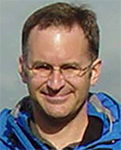University Of Michigan’s Africa Oceanography School

Brian Arbic
(Liberia, Ghana 1990–92)
The Coastal Ocean Environment Summer School In Nigeria and Ghana, or COESSING, was founded by Brian Arbic, a physical oceanographer and U-M professor in the Department of Earth and Environmental Sciences. The summer school, which is endorsed by the UN Decade of Ocean Science for Sustainable Development (2021-2030), is set to receive $125,000 each year from 2025-2028 and split between U-M and the University of Ghana. The school funding is included in a larger project called Ocean Margins Initiative.
OMI is one of five projects that are part of the Ocean Biogeochemistry Virtual Institute, an initiative funded by Schmidt Sciences. OBVI has committed $45 million to fund the five research teams, composed of 60 scientists from 11 countries, over the next five years. The research will provide clarity on how much carbon dioxide the ocean can hold and the resilience of marine ecosystems in a rapidly warming world.
Arbic started the U-M-led summer school a decade ago along with Joseph Ansong, then a postdoctoral researcher in Arbic’s lab. The two first met in the early 1990s when Arbic was a Peace Corps volunteer secondary school teacher in Ghana and Ansong was one of his students. Ansong is now a faculty member at the University of Ghana and is part of OMI.
Brian writes:
“From 1990-1992 I served in Ghana. I taught O-Level Math and Physics in Damongo Secondary School, in Ghana’s Northern Region. Before serving in Ghana I had a brief stint as a Peace Corps Volunteer in Liberia, cut short due to the civil war that plagued Liberia and neighboring Sierra Leone throughout the 1990s. After the end of my official Peace Corps service in Ghana, I traveled in Southern Africa for 16 weeks, and then returned to Ghana for a few months before heading back to the US in January 1993.”
His school, which runs for one week every summer, alternates between Nigeria and Ghana and comprises a rotating roster of about 150 participants ranging from undergraduate, graduate, postdoctoral and faculty researchers to employees of nonprofits, nongovernmental organizations, the private sector and government agencies. Attendees hail from around the world and especially from the continent of Africa.
“The summer school is still going to be a place where researchers from the Global North and South meet, but now the school will be connected to a well-funded research project,” said Arbic, one of the co-principal investigators of OMI. “As people are worried about climate, we shouldn’t forget that a big part of the climate story is the ocean, which stores and transports a lot of heat and carbon.”
The OMI is focused on studying the biogeochemistry in the Gulf of Guinea area, an underserved and understudied region of the ocean, Arbic said. An important goal of the project is to develop collaborations between oceanographers from across the world. OMI, composed of 17 scientists from 13 institutions, will be led by Amala Mahadevan of the Woods Hole Oceanographic Institution, Melissa Omand of the University of Rhode Island and Edem Mahu of the University of Ghana.
“Climate research is one of Schmidt Sciences’ priority areas, and we are pleased to launch OBVI as part of a series of globally connected climate programs focused on advancing fundamental science to understand the implications of climate change and mitigation strategies,” said Stu Feldman, president of Schmidt Sciences.
“OBVI will address fundamental questions about specific mechanisms and regional processes. More broadly, it will fill a need in the ocean sciences for model refinement and integration looking across systems, scales, and habitats.”
Previously, COESSING had been funded primarily by programs at U-M, the National Science Foundation and the Office of Naval Research.
“From years of working together, we have built a family of networked scientists who care about advancing science in West Africa and global scientific collaboration more generally,” Arbic said. “The school will serve as an annual meeting place for the collaborators in the Ocean Margins Initiative project.
“We are bringing together marine and environmental scientists from around the world because ocean and climate change are not local problems. They are global problems.”
No comments yet.
Add your comment